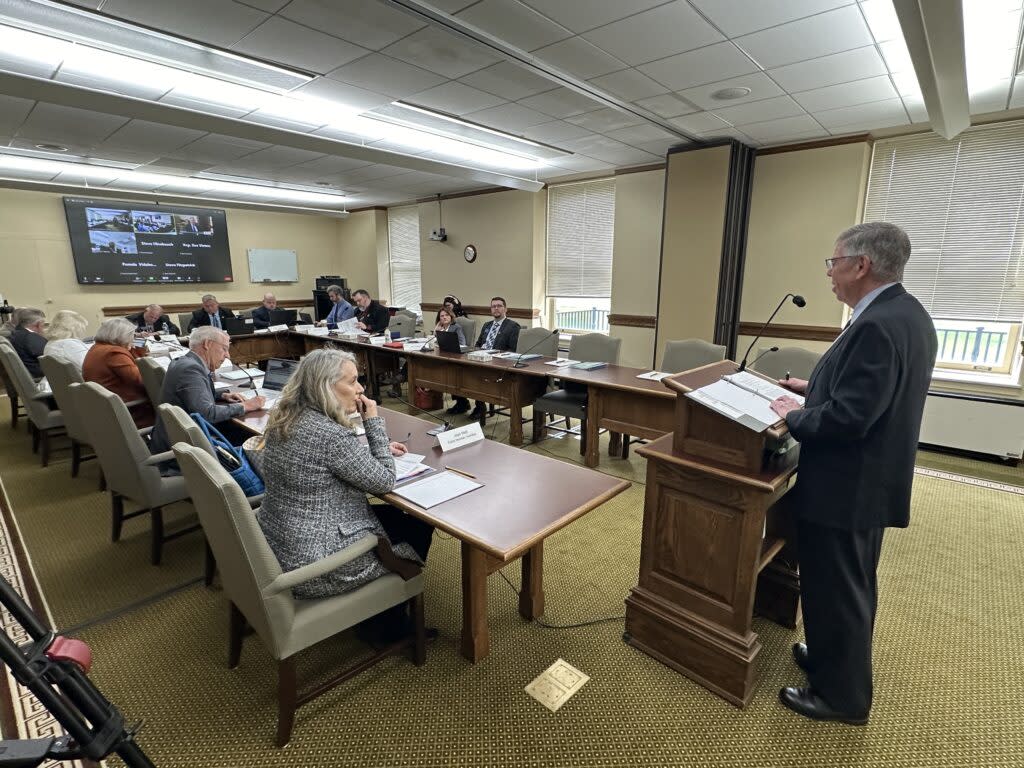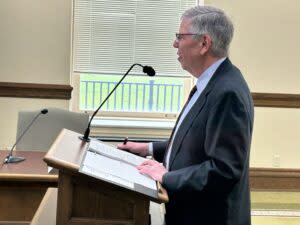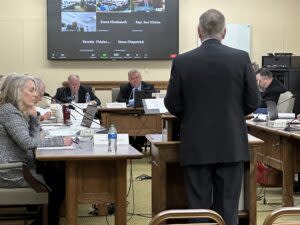Senate Republicans’ judicial oversight committee gets constitution lessons at first meeting

- Oops!Something went wrong.Please try again later.
Whitefish attorney Jim Ramlow provides a presentation on the constitution to the Senate Select Committee on Judicial Oversight and Reform on Monday, April 29, 2024. (Photo by Blair Miller, Daily Montanan)
Understanding Montana’s Constitution and the roles of each branch of government was the first lesson for the Senate Republicans’ Select Committee on Judicial Oversight and Reform, which held its first meeting Monday and heard from a Whitefish attorney about his interpretations of the constitution and the separation of powers.
Senate President Jason Ellsworth, R-Hamilton, formed the committee after court decisions struck down bills passed by the Republican-led Legislature from both of the past two legislative sessions as unconstitutional, leading Republicans to accuse the Supreme Court and some district courts of overstepping their bounds into legislative territory.
Whitefish attorney Jim Ramlow. (Photo by Blair Miller, Daily Montanan)
Monday’s initial hearing for the committee involved presentations from Whitefish attorney Jim Ramlow, a citizen member of the committee who also writes a column for the conservative think-tank Frontier Institute analyzing the concept of judicial review and the separation of powers. Ramlow was an 18-year-old intern at the 1972 Constitutional Convention.
“We’re not all attorneys here, so the education in the start of this, I think, is vital for the citizens out there to understand the process, for us to understand it, and for us to be effective as a committee,” Ellsworth told the committee at the start of the meeting.
Ahead of Ramlow’s presentations, Elllsworth introduced the three citizen members who do not have voting roles on the committee but who can ask questions and make suggestions. They are Ramlow, Billings attorney Andrew Billstein, and Hamilton attorney Joan Mell, who previously represented Ellsworth in a domestic dispute last year.
Ellsworth said in an interview they were picked out of about two dozen applicants based on what he said was their neutrality.
“Somebody that had knowledge that is probably beyond some of our basic members’ knowledge,” he said. “The three attorneys that I picked because they have intimate knowledge of the courts that we necessarily don’t have.”
Committee members spent most of the day in listening mode as Ramlow outlined the histories of the U.S. and Montana constitutions, Federalist Papers he thought were key to the discussion, court cases that shaped today’s case law, and how the legislative and judicial branches have interacted historically compared to more recently.
“Is a court that declares legislation in Montana unconstitutional … overstepping its powers? Is a legislature which is discussing reform of the judiciary overstepping its powers?” Ramlow posed to the committee. “Those are serious underlying questions in a theory of governance, and I’m sure that the committee will be discussing these in some detail as it proceeds along.”
Much of the discussion from senators — the only voting members on the committee despite there also being Republican House members and members from the public — surrounded specific court cases or policies and whether the legislature had any recourse when judges in Montana, who are also elected, strike their laws down as unconstitutional.
Ramlow told the lawmakers that Montana courts have for years exercised judicial review and do have the final say over constitutional questions in response to a question from Sen. Barry Usher, R-Billings, about whether courts were the ultimate decision-makers in disputes between the legislature and the judiciary.
He told the committee that while standards of review had changed from the 19th Century, to the early 20th Century, and then in more recent decades in courts across the country, courts don’t decide what cases to take or how to rule based on political persuasions.
Whitefish attorney Jim Ramlow provides a presentation on the constitution to the Senate Select Committee on Judicial Oversight and Reform on Monday, April 29, 2024. (Photo by Blair Miller, Daily Montanan)
“These are complex issues which the grownups in the room have to think carefully about. Not pointing fingers, not accusing people of bad character,” Ramlow said. “Part of my purpose in setting out this history is to say that these are recurring issues that were anticipated by the people who created a form of government that involves separation of powers. That separation of powers is what protects all of us from tyranny. We need to preserve it.”
Ramlow answered questions from lawmakers about more elementary aspects of the judicial system, including what case law, standing, and quashing mean, as well as on the different branches of government, responding to a question about how the university system Board of Regents is appointed by the governor and not the legislature.
He sometimes used baseball analogies to explain concepts, noting that in the 1800s, a “tie” in a case involving separation of powers questions between the judiciary and legislature might go to the lawmakers, but that has since changed.
“Have you ever watched a baseball game … where a manager or player questions a call? Have you ever seen an umpire change their mind? Why? What would happen to the umpire’s authority if there was a way in which the players or the managers could persuade umpires and it became a common practice for umpires to change their mind,” he postulated. “They would lose control of the game. They’re not the players. Nobody came to the game to watch the umpires, but they do play an important role.”
That led him to tell the committee that they must realize that Republicans hold all the power currently in Montana’s government, but that likely won’t always be the case. He said the committee needed to think carefully about its objectives because political dynamics change and choices made by current lawmakers could lead to different outcomes under future governments with different political goals.
“While I might be concerned about this legislature being overruled too often, there might be a situation in which a future legislature really ought to be overruled, and I would be disappointed if at that point the court didn’t have the power to do that,” he said.
Ramlow said he agrees that courts should give some deference to laws created by the elected representatives of the state but said there are times they cannot, and he believes judicial review needs to be preserved.
“These are issues which will always come to the surface in all sorts of contexts in a constitutional republic that has separation of powers, and that’s why I took time to go back over what Montesquieu and Madison and Hamilton had to say about human nature: When we give people power, as we’ve all heard, it tends to corrupt. And there has to be some form of pushback, there has to be some form of calling others to account when power gets too great,” he said. “So although I know there have been arguments that judicial review doesn’t exist, shouldn’t exist, I’m not there.”
House Minority Leader Kim Abbott, D-Helena, and Sen. Ryan Lynch, D-Butte, speak at a press conference about why their members are not participating in the select committee on judicial oversight on April 29, 2024. (Photo by Blair Miller, Daily Montanan)
True to their word, none of the five Senate Democrats appointed to the committee attended the meeting. Democratic leadership has called the formation of the committee a waste of time and resources and an attack on the judiciary branch based on court orders that did not go the way Republicans hoped.
“Instead of reflecting and maybe changing their approach to policy and acknowledging that Montanans have been challenging this legislation, we’ve seen them just engage in an attack on a coequal branch of government,” House Minority Leader Kim Abbott, D-Helena, said in a news conference when the committee took a lunch break.
Ellsworth said he was “highly disappointed” the Democrats did not show up, though their leadership has said from the outright that would be the case.
“This is an important meeting. We have a responsibility to the citizens of Montana, and this is not about party politics at all in any way, shape, or form,” he told the committee, adding that he hopes Democrats will participate in future meetings. A Democratic Senate staffer tried to read a letter from the five Democrats into the record but was told to just submit it instead.
Sen. Ryan Lynch, D-Butte, said he believed the first committee meeting could have been avoided if lawmakers had attended legal training the University of Montana’s law school provides legislators and that he sees no issues with Montana’s courts doing their job properly.
“The court doesn’t go looking for work. When the court responds to something, it’s because the citizens brought it in front of the court. And I think that’s pretty plain and simple that the court’s haven’t actually gone and found work for itself. It’s not out selling stuff and drumming up business,” he said. “So, I think, all in all, the majority party can have their hearing, they can have their process. At the end of the day, it’s really about respecting Montanans and respecting the Constitution, and it’s about doing what’s right for the state.”
As to where the committee goes from here, little was decided on Monday. Several lawmakers proposed writing bills to address some of the procedures that courts have cited in finding bills were unconstitutional. Senate Majority Leader Steve Fitzpatrick, R-Great Falls, as he has said in other committees, believes legislators need to directly address veto procedures, what it means for the legislature to be “in session,” and ensure that courts cannot interpret legislative rules.
Others proposed ideas that have come up in recent years about taking the Montana Bar out from the purview of the Supreme Court, changing the Judicial Standards Commission, and perhaps trying to convene another Constitutional Convention. There was also an extensive discussion about perhaps issuing subpoenas to various judges in Montana to come and testify.
But Ellsworth said he wanted to try and stay away from policy and focus on process. The committee is unlikely to meet again until after the June 4 primary, and he said the committee had lots of work ahead.
“It’s not necessarily the policy behind a bill, it’s the process that’s affecting the legislative body as a whole, and where we’re seeing things pass substantially and then being tied up in court,” Ellsworth said. “And then seeing what, in my eyes and 27 of my other senators who have signed the letter, what we believe are just plain, unconstitutional, that we can see with our eyes – actually addressing those issues without necessarily getting into the subject or the policy behind it.”
The post Senate Republicans’ judicial oversight committee gets constitution lessons at first meeting appeared first on Daily Montanan.




